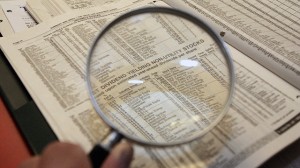
Michael Berman uses a magnifying glass to find dividend yielding stocks as he looks over one of his investment journals in his home in Cranberry, Pa. Friday, Oct. 24, 2008. (AP Photo/Keith Srakocic)
“Over the last decade or so, economists have become a lot more creative in figuring out where corruption is taking place, or firms are cheating,” explains Edward Miguel, a scholar at UC Berkeley. “There’s a lot more data publicly available than there used to be, and the basic idea is to try to assemble as much data as you can, and then look for patterns that are inconsistent with each other, but are consistent with someone cheating.”
A good example: Raymond Fisman of Columbia Business School (who co-authored Economic Gangsters: Corruption, Violence, and the Poverty of Nations with Miguel), wanted to quantify how much stuff was being smuggled from Hong Kong to mainland China. He figured out that because there are import duties on goods coming into China but no taxes on exports from Hong Kong, people had little incentive not to report what they were shipping out. When he looked at the difference between the export data from Hong Kong and the import data from China, he determined that the higher the import tariff on a given good, the more of it seemed to have “vanished” in transit.
University of Chicago economist Steven Levitt, author of Freakonomics, and Columbia University sociologist Sudhir Venkatesh, combined surveys of street-level prostitutes in Chicago with police reports to determine that “a prostitute is more likely to have sex with a police officer than to get officially arrested by one.” According to the authors, three percent of Chicago street prostitutes’ sex acts are “freebies” offered to cops in order to avoid arrest.
When it comes to legal corruption – the influence of big money in politics – a popular approach is to study stock prices. Researchers look at how a lawmaker’s changing fortunes affect the share prices of companies or industry groups to which he or she is linked. “What people have documented is that there is value to making campaign contributions, there is value to lobbying,” Mara Faccio, a professor of finance at Purdue University, tells Moyers & Company. “So, whenever a political tie vanishes, the value of a company is affected quite drastically.”
Faccio’s research uses a narrow definition of politically connected firms, only including those with at least one current officeholder on their boards of directors. Congressional rules make that situation a rarity (our legislators tend to get those cushy board positions after they leave office). But other researchers have looked at how companies connected to legislators through lobbying or campaign contributions fared when those lawmakers’ situations changed.
In one of the first of these studies, Brian Roberts looked at how the markets reacted to the sudden death of Senator Henry “Scoop” Jackson in 1983 ($$). Jackson, the senior senator from Washington, had been a huge presence in the upper chamber, having served for three decades at the time of his death. A notoriously hawkish Democrat, Jackson chaired the Armed Services Committee. When he died, Sam Nunn (D-GA), took his gavel. Roberts found that the share prices of companies with ties to Jackson tanked at the news, while firms that had close relationships with Nunn saw significant gains.
Edward Miguel says that these findings have been replicated again and again. He described a study of the market before and after Vermont Senator Jim Jeffords left the Republican Party in 2001, handing control of the Senate to the Dems. “In the days after Jim Jeffords’ announcement,” says Miguel, “firms that had given heavily to Republicans in the previous election cycle lost value on the New York Stock Exchange,” while share prices for companies that had given to Democrats spiked.
A similar study conducted by three researchers at the University of North Carolina found that the stock value of companies with former Republican lawmakers on their boards increased by an average of three percent when the Supreme Court handed the 2000 election to George W. Bush, while companies with former Democratic politicians on their boards dropped by the same amount.
Mara Faccio found that the value of a political connection isn’t the same in every country. In those with high levels of corruption, cozying up to a politician gives a company significantly more benefit than it does in countries with strict rules governing conflicts of interest. In the U.K., for example, when Rolls-Royce Chairman John Moore was appointed to the House of Lords, it didn’t budge the company’s stock price. But in Italy it’s a very different story. When Fiat chief Giovanni Agnelli was appointed to the Italian Senate, Fiat’s stock soared by 3.4 percent, adding millions of dollars in value to the company in a matter of hours.
“Unfortunately,” says Miguel, “the United States is more like Italy. We’re sort of kidding ourselves if we think that because we’re the U.S., we’re immune to these problems. We just haven’t paid enough attention to these issues, and business is very powerful in this country.”

